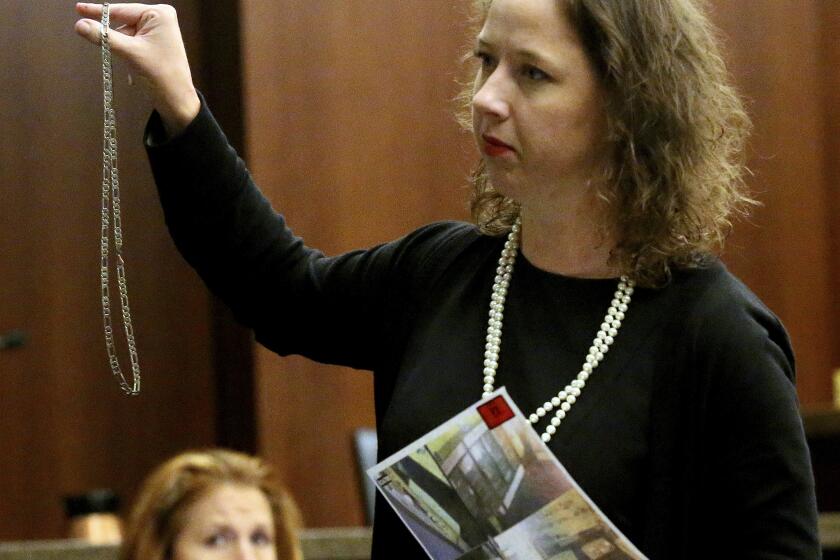Yemen Slayings Seen as Attack on ‘Foes’ of Islam
Early last year, Abed Abdul Razak Kamel and his wife visited doctors at the small American Baptist-run hospital here and asked for help having a baby. In a society that prizes large families, Kamel said his wife was plagued with miscarriages.
But when Lee Hixon thinks back now on what seemed to be a routine visit, he believes that his friends -- William Koehn, shot in the stomach and face; Martha Myers, shot in the head and chest; Kathleen Gariety, shot in the heart -- were the victims last week of a calculated attack.
Kamel’s decision to kill the hospital workers, either because they were Christian, because they were Americans -- or both -- appears to have been made with care and patience.
“The investigation is leaning in that direction,” said Hixon, the assistant hospital administrator. “It was well planned.”
After his first visit to the hospital, Kamel returned Dec. 30. He arrived early, about 6 a.m. when the hospital doors first opened. He got right in because he carried a return pass from his first visit.
Two and a half hours later, he walked into an office and shot physician Myers, 57; hospital administrator Koehn, 60; and office worker Gariety, 53. Myers and Gariety died instantly. Koehn died half an hour later on a stretcher as his wife held his hand.
On any previous day, Hixon, 48, would have been in the room with the three who died. But a new meeting schedule had been implemented that day and he was in another office.
He recounts the affair almost in slow motion, dazed by what seems unfathomable: That decades of providing medical care to one of the poorest communities in one of the world’s poorest countries would somehow culminate in the carefully planned killing of his friends and the wounding of a pharmacist; that it happened just one day before the Baptists turned control of the hospital over to Yemeni authorities after 35 years; that Koehn planned in a few months to clean out his desk after 28 years and retire.
Yemen is a country struggling with itself. It is a deeply conservative, tribal-based society plagued by poverty, rapid population growth, heavily armed civilians and weak political institutions.
It also is a nascent democracy. Its president is trying to join with the United States to fight terrorism while maintaining ties with conservative elements at home. These forces have created a dual reality, one in which terrorists can still hide out and U.S. agents have wide latitude to hunt them down.
In a country that has made it a crime to convert from Islam to Christianity, people were concerned about the hospital’s potential for evangelism. Yet they were deeply grateful for the quality of medical care. Some say it was the best in all of Yemen.
But something disturbed the balance. Some people believe that it was the economy. Unemployment is estimated at 35%, and a third of the population is living below the poverty line. Others say it is a strong thread of religious extremism that has taken root in Yemen and is feeding off a recent rise in anti-American sentiment.
What seems clear, though, is that the killings were part of an overall plan to attack people viewed as enemies of Islam. Authorities here have already said that Kamel was a follower of a young preacher named Ahmed Ali Jarallah. The preacher is in prison, charged with fatally shooting popular leftist politician Jarallah Omar two days before Kamel opened fire in the hospital.
Although no one here has been able to prove any link between him and Al Qaeda, Kamel also demonstrated the patience that has been the hallmark of attacks by Osama bin Laden’s terrorist network.
When he surrendered, Kamel said that he was striking out against missionaries seeking to convert Muslims and that he expected to go to heaven someday for his act.
Jibla is a four-hour drive from Sana, the capital, through dry, boulder-strewn mountains, past small communities, some piled high on cliffs and rock outcroppings, safe from intruders but also cut off from the world.
The city is more than 900 years old and its name refers to the solid ground -- hard rock and mountain -- on which it sits. In its glory days in the 11th century, Jibla was the capital of the country, ruled by Queen Arwa.
Remains of the queen’s castle, a few crumbled walls atop a hill, still tower above the city.
Jibla’s stone houses have no running water. Barefoot children in torn and filthy clothing play in the unpaved streets.
Midway up the mountain, in an almost idyllic compound, sits Jibla Hospital. It was opened by a Baptist missionary in the late 1960s.
During the 1991 Persian Gulf War against Iraq, the hospital was the target of anti-American demonstrations.
Five years ago, seven local residents were jailed for converting to Christianity. They were freed after returning to Islam, said Sadik Mohammed Abdel Kady, 28, a caretaker at the Grand Mosque, an ancient, whitewashed complex high above the city.
In recent times, hospital officials said, local preachers repeatedly attacked the hospital staff during prayer services.
“They used to preach against us for hours, especially in Friday prayer,” said Kaye Rock, 58, a nurse practitioner who has been at the hospital for seven years.
Since the killings, the community has shown tremendous support for the hospital and many people have expressed outrage at the loss of innocent life. The critical sermons have stopped, at least publicly.
The hospital staff has also gone out of its way to tell local people that it does not blame them, that it respects their faith and never intended to convert them. Some observers said they hope the shock will spur more moderate Yemenis to speak out against the minority extremists.
There is some evidence that has occurred.
“What happened is very bad and is not a human act,” said Ali Mohammed Hassan, a Jibla resident and water-pipe repairman in his 60s. “We have no conflict with Christians.”
But missionaries are still missionaries and Yemen is still a place where conversion is viewed as a crime and Christians seen as nonbelievers. So it is impossible to wipe away the underlying tensions, which have complicated Yemen’s efforts to work with the United States.
At the top of the Jibla Hospital compound, a small garden curls up the mountainside. There, beneath a eucalyptus tree, is a mound of freshly dug earth. It is the common grave of Myers and Koehn. Their families asked that they be buried in Yemen because they had chosen to make it their home.
As Hixon stood at the foot of their graves reminiscing about his lost friends, a local man walked up on the other side of the perimeter fence. With a smile, Mohammed Abdul Karim, 26, said: “Bill is sleeping. He was a very good man.... Martha was a friend of the country.”
Hixon smiled back. “They are with God,” he said.
“Maybe,” Abdul Karim replied.
More to Read
Sign up for Essential California
The most important California stories and recommendations in your inbox every morning.
You may occasionally receive promotional content from the Los Angeles Times.









